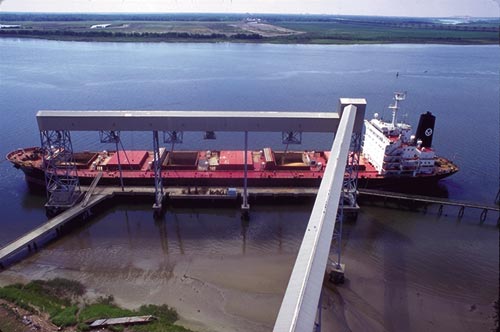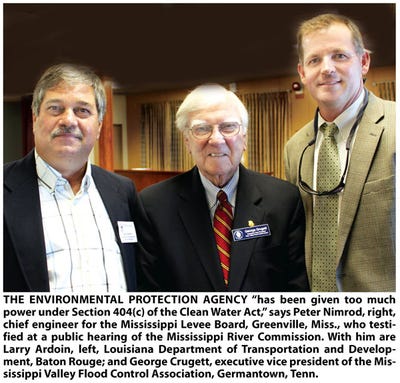
Delta flood control work threatened by ‘environmental extremists’
Actions by “extremist environmental organizations trying to take over Washington” and issues of concern “have made the flood control community very nervous,” the Board of Mississippi Levee Commissioners said in a statement at a Greenville, Miss. hearing of the Mississippi River Commission. “If these proposals continue to be introduced and passed by Congress,” said the board’s chief engineer, Peter Nimrod, “future flood control projects will never happen and our current flood control projects may be in jeopardy as well."

Actions by “extremist environmental organizations trying to take over Washington” and issues of concern “have made the flood control community very nervous,” the Board of Mississippi Levee Commissioners said in a statement at a Greenville, Miss. hearing of the Mississippi River Commission.
“If these proposals continue to be introduced and passed by Congress,” said the board’s chief engineer, Peter Nimrod, “future flood control projects will never happen and our current flood control projects may be in jeopardy as well.
“It appears that Washington has forgotten about our mistakes in the past, such as the 1927 flood, and we are moving at light-speed toward repeating these mistakes.”
 Issues of concern, Nimrod said, include the moratorium on funding earmarks that Congress has adopted for the next two years.
Issues of concern, Nimrod said, include the moratorium on funding earmarks that Congress has adopted for the next two years.
“Basically, Congress has given up its right to appropriate money, and has relinquished that right to the Office of Management and Budget (OMB).
“OMB always provides a budget that undercuts our projects in the Mississippi River and Tributaries project because they know Congress will provide ‘congressional adds.’ Unfortunately, people think these congressional adds for the MR&T project are earmarks.
“Earmarks account for less than 1 percent of the entire federal budget — but, it is these earmarks that provide money for much-needed, essential projects, and provide jobs for the economy,” Nimrod said. “The federal stimulus money spent the last two years created jobs, built projects, and stimulated the economy.
“This ban on earmarks will cause many projects to be stopped, jobs will be lost, and the economy will fall right back into recession. Congress needs to define what an earmark is, and they need to be able to do congressional adds for our projects.”
The Environmental Protection Agency “has been given too much power under Section 404(c) of the Clean Water Act,” which allows the agency to veto congressionally-authorized projects, Nimrod said.
“During the early 1990s, due to abuse of the 404(c) power by the EPA, Congress considered removing this authority from the agency. But, the EPA has again invoked this veto power on the Yazoo Backwater Project,” which was authorized 70 years ago by the Flood Control Act of 1941 to protect the Delta region of Mississippi from flooding.
A line in the sand
“The EPA is saying you can’t lower the water level with a flood control project. By killing this project with 404(c) veto authority, the EPA is drawing a line in the sand over the future of flood control in our great nation.”
The EPA has vetoed the project, Nimrod said, “even though it was approved, authorized, and funded by Congress, and was exempt from a 404(c) veto by 404(r).
“It’s time to take up this issue again and remove the 404(c) veto power from the EPA before they kill another flood control project that has been authorized by Congress.”
The Final Reformulation Report for the Yazoo backwater project was released Nov. 16, 2007, and the EPA “illegally vetoed” it Aug. 31, 2008, Nimrod said.
 “In 2008, the backwater got to 92.2 feet, which flooded 344,000 acres, including 121,000 acres of farmland. In 2009, the backwater got to 93.7 feet, which flooded nearly 400,000 acres, including 152,000 acres of farmland. Trees and wildlife were decimated by this flooding.”
“In 2008, the backwater got to 92.2 feet, which flooded 344,000 acres, including 121,000 acres of farmland. In 2009, the backwater got to 93.7 feet, which flooded nearly 400,000 acres, including 152,000 acres of farmland. Trees and wildlife were decimated by this flooding.”
In August 2009, the Mississippi Levee Board filed a complaint in the U.S. District Court for the northern district of Mississippi, suing the EPA over the veto.
“We believe the EPA had no legal authority to veto this project, and we asked the court to declare the veto null and void,” Nimrod said.
But, on March 28 this year, the U.S. district judge ruled against the board without granting it oral arguments.
“The board and its attorneys have reviewed the ruling and have found what they believe are errors in the ruling,” he said. “The board voted unanimously to appeal the case to the U.S. Court of Appeals for the Fifth Circuit.”
The Yazoo Backwater Project is “a model project that will not only provide flood protection, but will vastly increase benefits for every environmental resource category, such as wetlands, terrestrial, aquatic, and duck habitat through the reforestation of the flood plain,” Nimrod said.
“The residents of the south Mississippi Delta just want what was promised them 70 years ago – it is time to complete this last phase of flood protection for the Mississippi Delta.”
No workable framework
Another concern for the board, he said, is that the Council of Environmental Quality draft proposal of changes to the Principles and Guidelines for Federal Agencies “fails to establish a clear, concise, and workable framework to guide development of water resources projects.
“It is incoherent and inconsistent, and thus is not implementable in a practical sense. It substantially fails to comply with the explicit directions in the Water Resources Development Act of 2007, as well as a large body of previous law and policy related to water resources.”
It is written, Nimrod said, “so as to not require, or even encourage, use of proven analytical tools to distinguish among alternatives. It elevates environmental considerations over economic benefits, social well-being, and public safety.
 “Because of these critical and extensive failings, the board recommends that this effort be put aside and restarted from the beginning.”
“Because of these critical and extensive failings, the board recommends that this effort be put aside and restarted from the beginning.”
In other testimony, Dean Pennington, executive director of the Yazoo Mississippi Delta Joint Water Management District, told the commission that “more and more, problems in our region center on not having the water we need at critical times.
“Agriculture is becoming more dependent on water for irrigation in order to remain a viable industry, and we’re beginning to see a strain on groundwater resources.
“It is important that we use every gallon of water efficiently, and that we find ways to develop new supplies,” Pennington said. “We feel the Corps of Engineers is our logical partner, and we hope the Corps can find ways to expand its mission in order to achieve these goals.”
Water supply “is going to be the next biggest problem for coming generations,” said Lindsay Gouedy, education coordinator for the Louisiana Sparta Groundwater Commission.
The Sparta aquifer supplies water for 15 parishes, Gouedy noted, eight of which have no other source of potable water.
“Our challenge is, how can we bring everyone on board to preserve these critical water resources,” Gouedy said. “If we don’t do this, we will be leaving to our children the water problems we’re not dealing with today. We need to do more to educate people about these water issues and the need for conservation of these vital resources.”
About the Author(s)
You May Also Like



